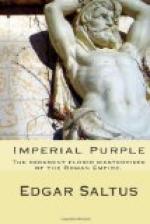Apart from the neurosis from which she suffered, were it possible to find an excuse for her conduct, the excuse would be Claud. The purple which made Caligula mad, made him an idiot; and when in course of time he was served with a succulent poison, there must have been many conjectures in Rome as to what the empire would next produce.
The empire was extremely fecund, enormously vast. About Rome extended an immense circle of provinces and cities that were wholly hers. Without that circle was another, the sovereignty exercised over vassals and allies; beyond that, beyond the Rhine on one side, were the silenced Teutons; beyond the Euphrates on the other, the hazardous Parthians, while remotely to the north there extended the enigmas of barbarism; to the south, those semi-fabulous regions where geography ceased to be.
Little by little, through the patience of a people that felt itself eternal, this immensity had been assimilated and fused. A few fortresses and legions on the frontiers, a stretch of soldiery at any spot an invasion might be feared; a little tact, a maternal solicitude, and that was all. Rome governed unarmed, or perhaps it might be more exact to say she did not govern at all; she was the mistress of a federation of realms and republics that governed themselves, in whose government she was content, and from whom she exacted little, tribute merely, and obeisance to herself. Her strength was not in the sword; the lioness roared rarely, often slept; it was the fear smaller beasts had of her awakening that made them docile; once aroused those indolent paws could do terrible work, and it was well not to excite them. When the Jews threatened to revolt, Agrippa warned them: “Look at Rome; look at her well; her arms are invisible, her troops are afar; she rules, not by them, but by the certainty of her power. If you rebel, the invisible sword will flash, and what can you do against Rome armed, when Rome unarmed frightens the world?”
The argument was pertinent and suggestive, but the secret of Rome’s ascendency consisted in the fact that where she conquered she dwelt. Wherever the eagles pounced, Rome multiplied herself in miniature. In the army was the nation, in the legion the city. Where it camped, presto! a judgment seat and an altar. On the morrow there was a forum; in a week there were paved avenues; in a fortnight, temples, porticoes; in a month you felt yourself at home. Rome built with a magic that startled as surely as the glint of her sword. Time and again the nations whom Caesar encountered planned to eliminate his camp. When they reached it the camp had vanished; in its place was a walled, impregnable town.
As the standards lowered before that town, the pomoerium was traced. Within it the veteran found a home, without it a wife; and the family established, the legion that had conquered the soil with the sword, subsisted on it with the plow. Presently there were priests there, aqueducts, baths, theatres and games, all the marvel of imperial elegance and vice. When the aborigine wandered that way, his seduction was swift.




